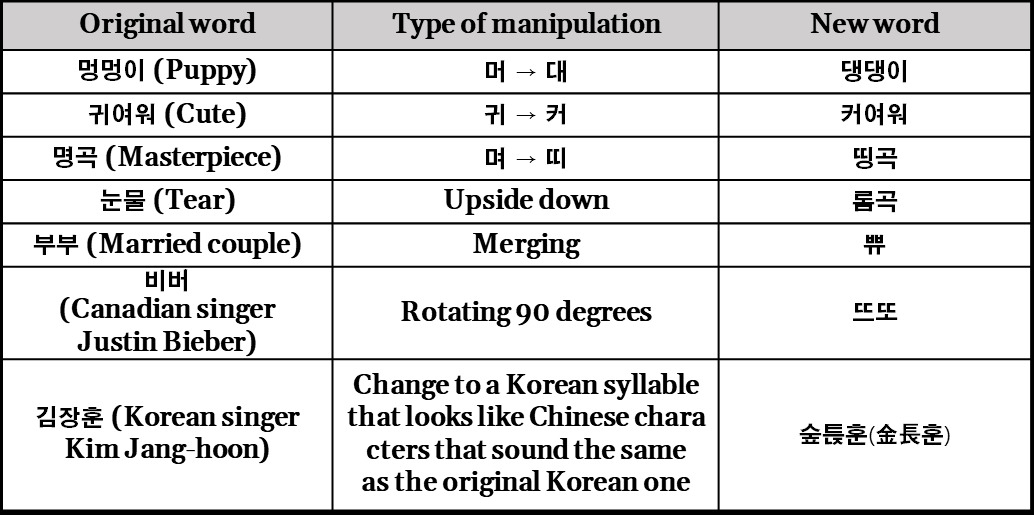Mutilating Hangeul: visual puns as a parallel orthography
« previous post | next post »
Bizarre scriptplay in Korea:
[Newsmaker] "What is ‘daengdaengi?’ Government’s use of Hangeul slang stirs controversy"
By Lim Jae-seong, The Korea Herald (Oct 7, 2022)
The article is rather long. Here I quote only the first portion, but will summarize some of the more important points at the bottom.
The National Institute of Korean Language’s use of slang words on its recent social media post has stirred controversy, questioning whether it is right for the state-run language regulator to use a distorted version of the language.
To mark the upcoming Hangeul Day on Sunday, the institute had posted an image to announce its special event on its Twitter account last month. In the posted image, it asked the followers what their views are on using the so-called “Yaminjeongeum.”
Yaminjeongeum — a composed word of Hunminjeongeum, the early form of Hangeul, and “Yagu Gallery,” an anonymous online message board for baseball fans — is a term that was widely used by the users of the forum and later spread widely as an internet meme.
This word play modifies Hangeul words by changing a syllable or a vowel to one that looks similar. For example, the Korean syllable 멍 ("Meong") is substituent for 댕("Daeng") and 커 ("Keo") is for 귀 ("Gwi") because of their visual similarities.
In the controversial image, the institute gave examples of Yaminjeongeum, and included words like “daengdaengi,” originated from “meongmeongi” (dog), and “keoyeowo,” originated from “gwiyeowo” (cute), which are both words that are in popular use.
The post drew harsh criticism online, with users claiming the event can be seen as the government agency responsible to preserve Hangeul approving of the internet meme that is "destroying" Hangeul. Met with backlash, the institute took down the post two hours later and decided to scrap the event.
“We had just regarded it as wordplay that Korean speakers enjoy. But after our social media followers informed us where the Yaminjeongeum came from, we decided to halt the event,” a NIKL official was quoted as saying in an interview with local media.
 |
|
Examples of Yaminjeongeum words by the way of mutilation (Lim Jae-seong/The Korea Herald)
|
———
From what many consider to be the most perfect script on earth, Yaminjeongeum may be said to debase Hangeul to what seems to be a mindless game. In actuality, it is not mindless at all, and what alarms some opponents the most is that Yaminjeongeum, which reportedly began to go viral in the mid-2010s, has a right-wing orientation.
People who play the Yaminjeongeum game have different reasons for doing so. Some may indulge in it just for fun, while others may employ it as a device for keeping sensitive words difficult to search for on the internet. It's a way for preventing those who are not in the know from being aware of what the cognoscenti are thoroughly familiar with.
For example, Yaminjeongeum may be used to criticize politicians, backbite celebrities, and engage in hate speech. Mostly, though, it is just being sassy, cute, and clever, as when the K-pop group Apink styled a recent release of theirs, "Eung Eung 응응" with the visual pun %%. It has been used successfully for advertising foods, travel services, and all sorts of other products and business offerings.
So what is daengdaengi 댕댕이? Apparently it is a whimsical way to say "doggy" because it looks like meongmeongi i멍멍이, which is the word for "doggy". (source)
Is there any other language which has such an elaborate, versatile system of visual puns?
Selected readings
- "A Dartmouth grad's contribution to the development of Hangul" (6/25/15)
- "His Coffeeness" (4/10/14) — in the comments
- "The pragmatic and innovative Choe Sejin — 15th-16th c. Korean phonetician, translator, and interpreter" (4/21/22)
- "The esthetics of East Asian writing" (4/7/12)
- "Hangul: Joseon subservience to Ming China" (5/14/22)
- "Hangeul for Cia-Cia, part III" (1/7/10)
- "The Hangeul Alphabet Moves beyond the Korean Peninsula" (8/6/09)
- "Lojban just got harder" (4/5/15)
- "Visual puns in K-pop" (1/10/19)
[Thanks to Don Keyser]
Jongseong Park said,
October 9, 2022 @ 7:53 am
From what I've seen, the backlash against Yaminjeongeum absolutely has a lot to do with the association with the Yagu Gallery, which nowadays barely discusses baseball but has a reputation of being a bit of a cesspool of rightwing political and anti-feminist content (I don't frequent it so I don't know if this is true). There might also be a backlash against a class of youth slang, with which Yaminjeongeum is frequently associated.
But creative modification of Hangul words by no means originated in the Yagu Gallery nor is it confined to those circles. As mentioned in the article, impeached ex-president Park Geun-hye 박근혜 was called ㄹ혜 based on a modification of 근혜 (Geun-hye), though I'm not sure how this would be pronounced (Reu-hye?). It could have added that the current, deeply unpopular president Yoon Suk-yeol 윤석열 is called 굥 (Gyong) from turning 윤 (Yoon) upside down, leading to the sarcastic nickname 굥정 (Gyongjeong), a play on his buzzword 공정 (gongjeong, 'fairness'). This latter at least seems to originate from the left-leaning corners of the internet.
KWillets said,
October 9, 2022 @ 8:50 pm
댕댕이 sounds familiar — I think it's fairly popular, and neutral.
But I don't doubt the political aspect since there are other games such as drawing figures or intentional misspellings that don't draw any objection.